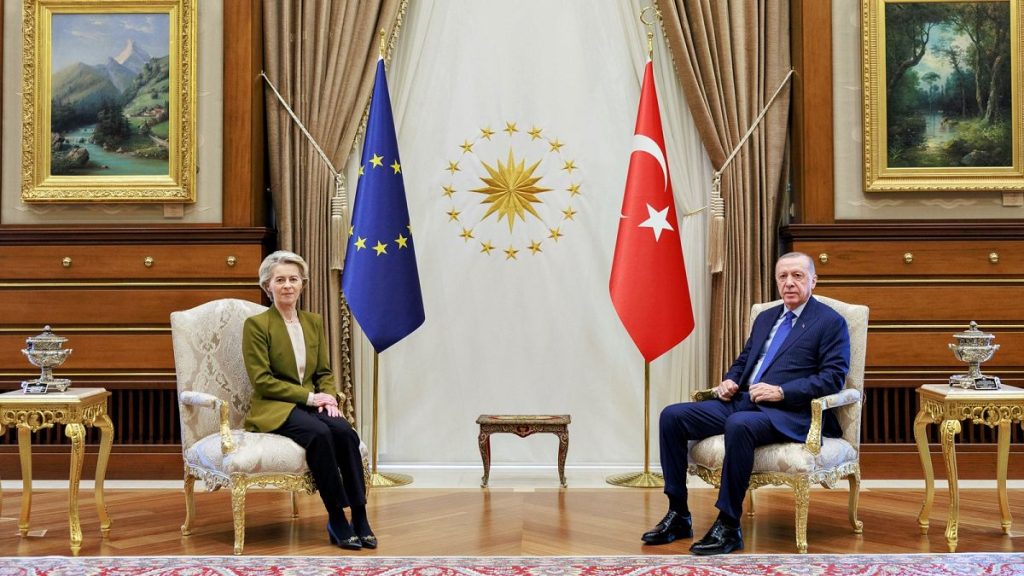The meeting between Turkish President Recep Tayyip Erdoğan and European Commission President Ursula von der Leyen in Ankara served as a platform for both leaders to address the evolving geopolitical landscape, particularly concerning Syria’s transition and the refugee crisis. Erdoğan emphasized the necessity of a strengthened and institutionalized relationship between Turkey and the EU, urging the lifting of restrictions, the resumption of high-level dialogue, the modernization of the customs union, and expedited visa processes. He highlighted Turkey’s strategic importance in the region, amplified by its role in mediating the Syrian transition of power and hosting millions of Syrian refugees. Erdoğan’s call for a “win-win” approach underscored his desire for a mutually beneficial partnership that recognizes Turkey’s growing influence.
Von der Leyen, acknowledging the multifaceted nature of the EU-Turkey relationship, announced a €1 billion aid package for Syrian refugees in Turkey, demonstrating the EU’s commitment to addressing the humanitarian crisis. This funding, adaptable to changing circumstances, can also facilitate the voluntary, safe, and dignified return of refugees to Syria when conditions permit. She cautiously addressed the possibility of refugee returns, emphasizing the need for stability and security in a post-Assad Syria. Von der Leyen’s approach balanced acknowledging Turkey’s significant role in the region with maintaining the EU’s principles regarding human rights and international law.
The two leaders navigated a complex diplomatic dance, addressing key issues while carefully sidestepping potential points of contention. Erdoğan focused on strengthening bilateral ties and highlighting Turkey’s regional leverage, while Von der Leyen emphasized humanitarian aid and the potential for future cooperation. The contrasting emphases reflected the differing priorities of the two parties: Turkey seeks enhanced political and economic integration with the EU, while the EU aims to manage the refugee crisis and promote stability in the region while upholding its own values.
Erdoğan’s assertive stance reflected Turkey’s expanded regional influence in the aftermath of the Syrian conflict. Turkey’s support for the Syrian National Army and its engagement with Hayat Tahrir al-Sham have positioned it as a key player in shaping Syria’s future. This enhanced role has attracted high-profile visits from international leaders, including Von der Leyen, Hungarian Prime Minister Viktor Orbán, and US Secretary of State Antony Blinken, underscoring Turkey’s geopolitical significance. Erdoğan leveraged this prominence to advocate for greater EU engagement and recognition of Turkey’s interests.
Von der Leyen’s approach was marked by a combination of pragmatism and principle. While offering significant financial support for Syrian refugees, she avoided making concrete commitments on sensitive issues like Turkey’s EU accession or visa liberalization. She stressed the need for Turkey to address issues such as trade barriers and human rights concerns, implicitly linking progress in these areas to closer EU ties. By focusing on practical cooperation and humanitarian aid, Von der Leyen aimed to maintain a working relationship with Turkey while avoiding concessions on fundamental EU principles.
The meeting highlighted the delicate balance the EU seeks to strike with Turkey. On one hand, Turkey’s strategic location and its role in managing the refugee crisis make it an indispensable partner. On the other hand, concerns about democratic backsliding and human rights violations continue to hinder closer political integration. Von der Leyen’s visit underscored the EU’s commitment to engaging with Turkey on critical issues, while also subtly reiterating the importance of adhering to shared values and principles. The contrasting approaches of Erdoğan and Von der Leyen reflect the complex and evolving nature of the EU-Turkey relationship, marked by both cooperation and underlying tensions.

